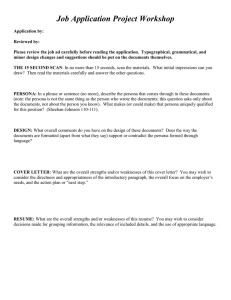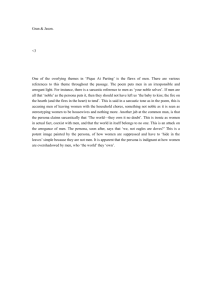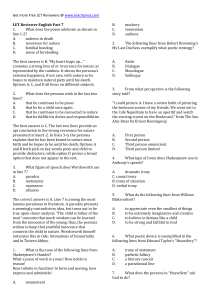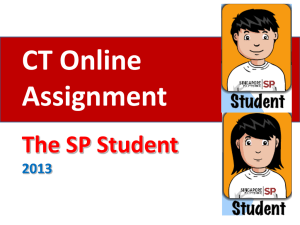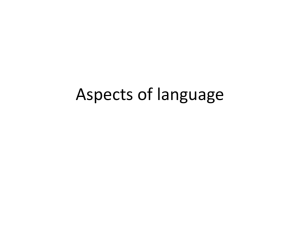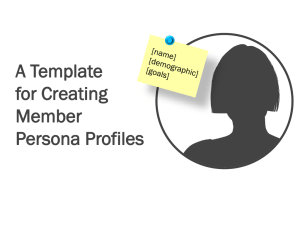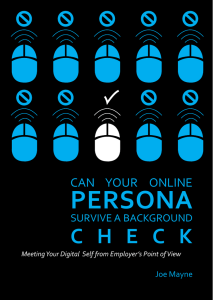SpringBoard: Unit 2 Academic Vocabulary Cornell Way Notes
advertisement
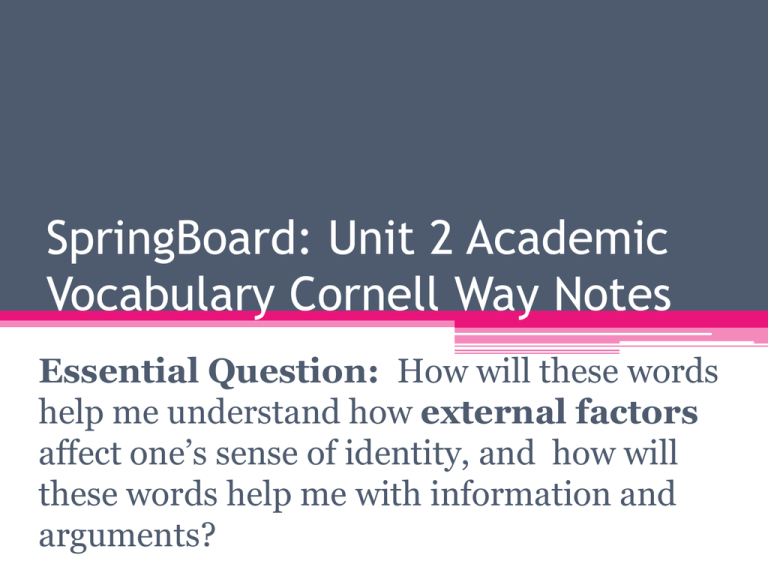
SpringBoard: Unit 2 Academic Vocabulary Cornell Way Notes Essential Question: How will these words help me understand how external factors affect one’s sense of identity, and how will these words help me with information and arguments? Juxtaposition • The arrangement of normally unassociated ideas, words, or phrases are placed next to one another, creating an effect of surprise and wit. • Also a form of contrast which writers call attention to • Examples: ▫ He was slouched alertly. ▫ “Injustice anywhere is a threat to justice everywhere.” Martin Luther King Cultural Conflict • A struggle that occurs when people with different cultural expectations or attitudes interact. • Examples ▫ Share examples from your essay with a partner! Persona • The voice assumed by a writer to express ideas or beliefs that may not be his or her own. • The author’s “second self.” • Like a mask that the author wears. • Example: Persona Activity • What did you learn about persona through this activity? Synthesis Essay • The act of combining ideas from different sources to create, express, or support a new idea. Structure of an Argument • Argument- a form of writing that presents a particular opinion or idea and supports it with evidence. • Hook – an interesting quotation, anecdote, or example at the beginning of a piece of writing that grabs the readers’ attention. • Claim-a position statement (or thesis) that states your belief and what you wish to argue. Structure of an Argument continued… • Support- the reasoning behind your argument; you provide evidence behind your claim. • Concession- occurs when you recognize the arguments made by the other side. • Refutation- following the concession, the refutation argues against the opposing viewpoint by proving that your side has more validity. • Call to action- draws your argument to a close, restates your claim, and makes a final appeal to values. Satire • A manner of writing that mixes critical attitude with wit and humor in an effort to improve mankind and human institutions. • Example: http://tinyurl.com/6guf9t3 http://tinyurl.com/3shzycx What things were funny or amusing? Explain. Theatrical Elements • Elements employed by dramatists and directors to tell a story on stage. • Includes: ▫ ▫ ▫ ▫ ▫ Costumes: clothing worn by characters Makeup: cosmetics used to amplify characteristics Props: objects to help set the scene (realistic) Set: place where it takes place Acting choices: gestures, movements, staging, vocals, etc. Allusion • A reference to a well-known person, event, or place from history, music, art, or another literary work. • Examples: ▫ "I was not born in a manger. I was actually born on Krypton and sent here by my father, Jor-el, to save the Planet Earth.” Sen. Barack Obama ▫ The girl's love of sweets was her Achilles heel. Irony • Verbal ▫ Sarcasm-Opposite of what is said is meant. ▫ You walk into a door. Your friend says good going. • Situational ▫ When the opposite occurs of what you expect. ▫ Fire truck on fire. • Dramatic Irony ▫ When the audience knows something that a character does not know. ▫ Romeo kills himself not knowing that Juliet is alive. Hyperbole • An extreme exaggeration. • Examples: ▫ My dog is so ugly he only has cat friends. ▫ My teacher is so old she taught cave men how to start fires. ▫ I think about you a million times a day! <3 <3 <3 Understatement • A figure of speech in which a writer or a speaker deliberately makes a situation seem less important or serious than it is. • Examples: ▫ “Last week I saw a woman flayed, and you will hardly believe how much it altered her physical appearance.” – A Tale of Two Cities by Charles Dickens ▫ “It isn’t very serious. I have this tiny tumor in my brain.” – The Catcher in the Rye by J.D. Salinger ▫ When the Detroit Tigers lost the game to the Texas Rangers, 15-5, the manager told the reporter, “It wasn’t our best effort.” Summary & Reflection • Now, answer the essential question in two sentences. • Then, summarize the main points into three sentences.

